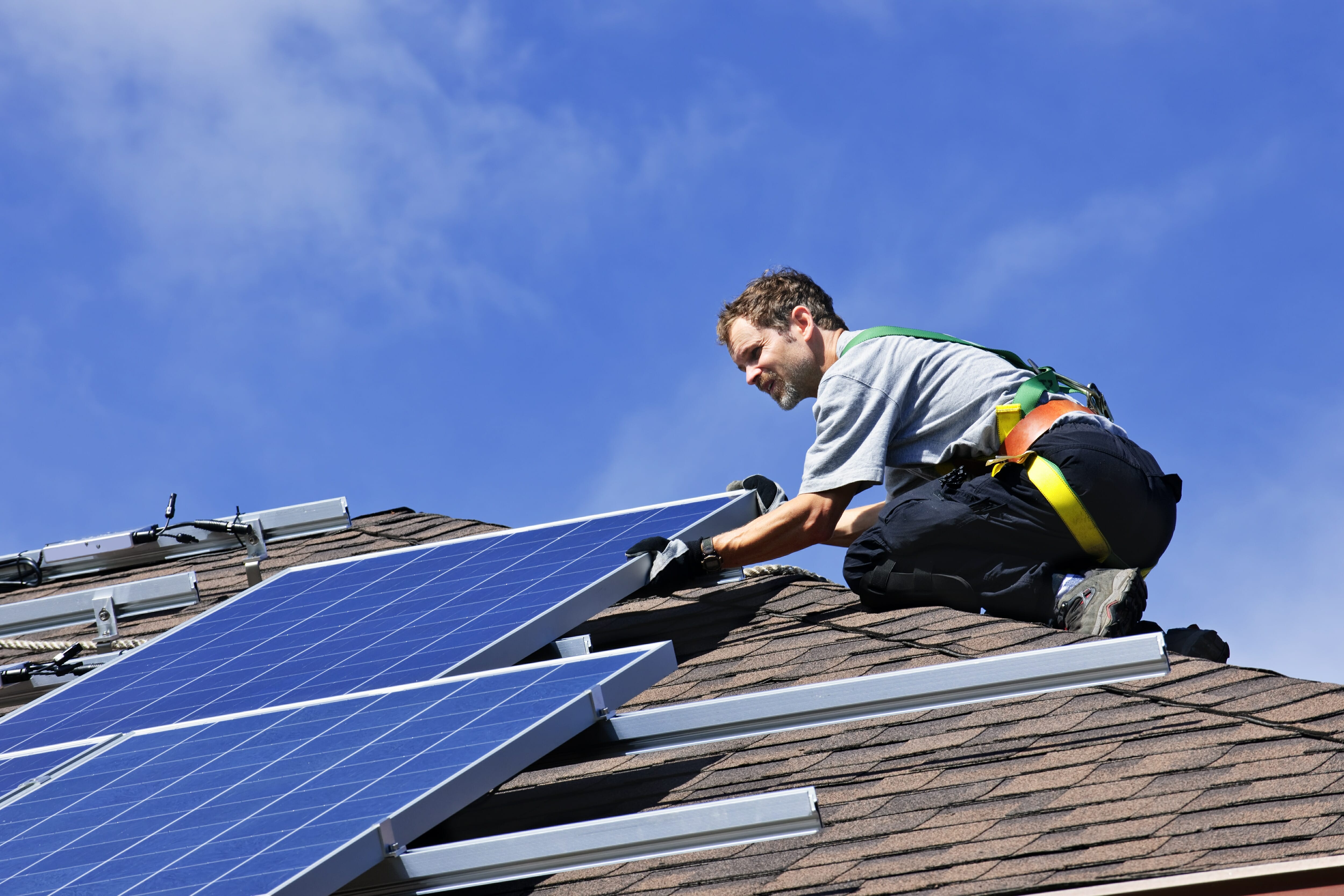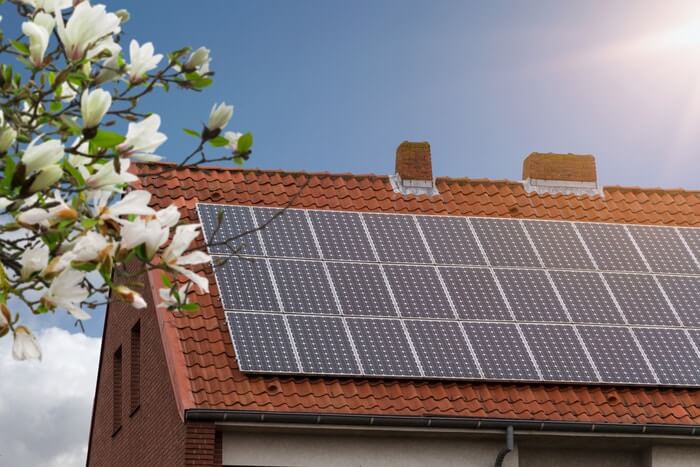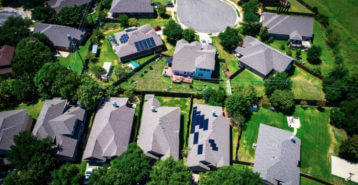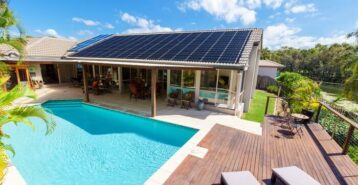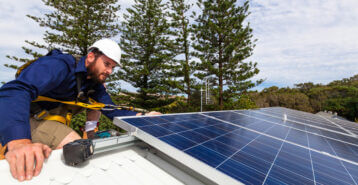Are you doing a solar project?
Modernize can pair you with three to four pros in your area, so you can compare options and save time and money.
- 1. Is My Home a Good Candidate for Solar Panel installation?
- 2. How Much Do Solar Panels Cost, and How Much Can I Save With Solar Energy?
- 3. Are the Weather and Climate in My Area Conducive to Solar Energy?
- 4. What Types of Solar Panels Are Available?
- 5. Will I Need to Get a New Roof?
- 6. Will Solar Power Be My Only Source of Electricity? Will My Home Still Be Connected to “The Grid”?
- 7. What Happens if My Panels Produce More Energy Than Needed?
- 8. How Long Does a Solar Panel Warranty Last?
- 9. Can I Lease Solar Panels Instead of Buying?
- 10. What if I Move?
- Final Thoughts on Installing Solar Panels
Whether you’re looking to minimize your carbon footprint, bring down energy bill expenses or increase your home’s ROI, homeowners everywhere are considering the benefits that come with making the switch to solar energy. Still, the process can be daunting and, at times, costly. Modernize interviewed Sunrun to help breakdown the questions and factors that need to be considered when it comes to going solar. Continue reading to find out everything you need to know.
1. Is My Home a Good Candidate for Solar Panel installation?
Factors to consider when weighing a home’s solar viability include the roof structure, the roof’s orientation, and nearby shade.
Solar panels or shingles need some space in order to be effective. The amount of space needed depends on how large your home is and how much power you’re hoping to produce. Typically, the minimum amount of roof space needed is about 200 square feet. That space should be clear of any obstructions like chimneys, pipes or skylights.
A roof’s orientation and sun exposure are also important factors when it comes to a home’s candidacy for solar energy. For instance, north-facing roofs see significantly less sunlight compared to south-facing roofs. Homes with south, southeast, and southwest facing roofs are among the best candidates for solar panels.
Finally, homeowners should consider the amount of shade near their roof and how that may impact the amount of sunlight hitting a panel. Factors like trees, neighboring homes, and other tall objects can impact the amount of sun your roof gets.
“Your home can still adopt solar power even if the roof receives some shade,” explains Miranda Barnard, director of integrated marketing for Sunrun. “It’s important to customize your solar installation plan so it has the correct number of panels, placed in best locations to optimize solar power.”
Barnard adds, “The overall cost is not dependent on the size of your home but is determined by your energy usage. Homes with more people, pets, or higher traffic in and out require more energy.”
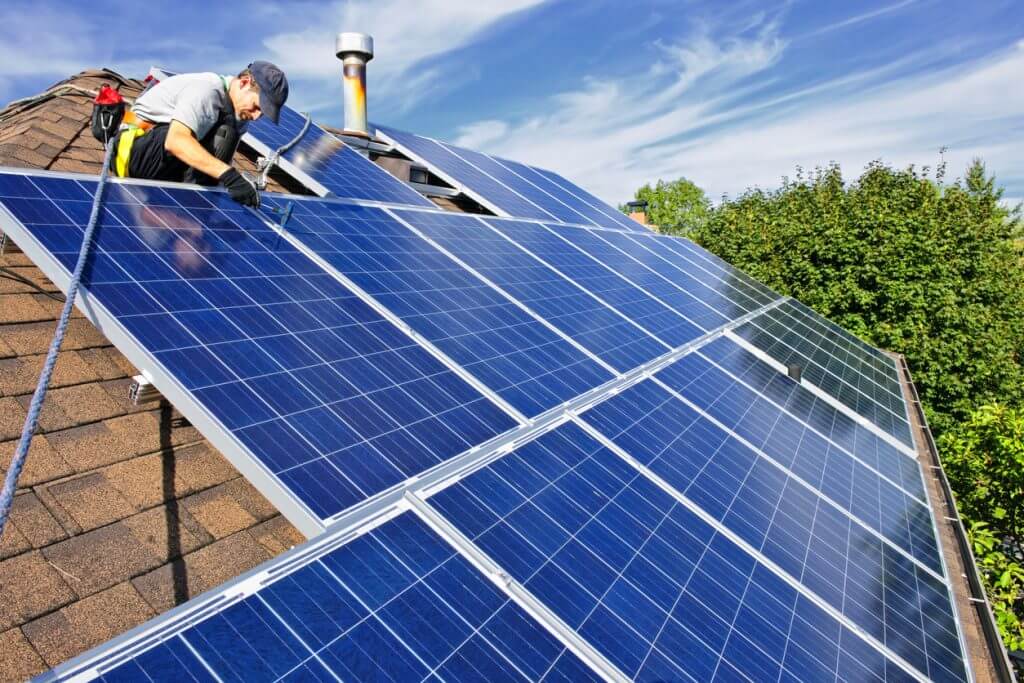
2. How Much Do Solar Panels Cost, and How Much Can I Save With Solar Energy?
There are a number of factors to consider when looking at the costs associated with solar energy.
Cash, loan, and lease options are all available when it comes to how to pay for the solar panel system. It’s also important to figure out what local and federal rebates and tax credits a solar energy system may entitle you to. Through 2026, there is a federal tax credit that allows homeowners to deduct 26 percent of the costs associated with installing a solar energy system from their taxes.
Different states — and even some cities — also offer rebates and tax credits of their own. Check out the Database of State Incentives for Renewables & Efficiency, or DSIRE, for the different opportunities available to you.
In terms of savings, according to Energy Sage, California homeowners see an average of $40,673 in savings over two decades. In New York, it’s $35,436. These are also both states where electricity bills are above average. Either way, you can expect about $1,000 or more in savings per year.
Google created an interactive program called Project Sunroof, which allows you to enter your address to see an estimate of how much money you would save. Not only does it look at your location, but also the size of your home and how the amount of peak sun hours your roof receives.
3. Are the Weather and Climate in My Area Conducive to Solar Energy?
Believe it or not, your region’s climate and weather can drastically impact your home’s solar energy production. Remember, solar energy relies on the sun to work. In turn, homeowners in cloudy and rainy areas may not see as much solar energy production, unless their solar installations are customized for their climate. Areas like Arizona are ideal of solar panels, while Vermont sees significantly less clear and sunny days.
If your state experiences overcast weather, you may still benefit from solar, but with the help of additional panels to compensate for cloud cover. Bear in mind, if you reside in a state that is cloudier, your energy usage is likely smaller than in sunny states, meaning the cost of solar production could still balance out. If you live in a place where solar panels could use an extra boost, consider looking into higher-efficiency panels.
4. What Types of Solar Panels Are Available?
There are several types of solar panels on the market for homeowners to choose from. They include mounted solar panels, movable panels and shingles.
Mounted panels are the most commonly seen and popular solar panels. They are made of silicon, which vary in efficiency and price. The more efficient monocrystalline silicon panels have the most longevity, but also come with a bigger price tag. Monocrystalline panels are sleek and black in color, which aids in their efficiency as black surfaces naturally absorb more light.
In contrast, polycrystalline silicon panels are more affordable and, in turn, more popular among consumers. Thin film solar cells are also praised for their low cost and portable nature, but they have a significantly shorter lifespan — an average of 15 years versus over 20 years. Polycrystalline panels are blue in color due to the anti-reflective coating.
You can also consider a tracking mount for your solar panels. These types of mounts are praised for their ability to follow the sun’s path (that’s how they get their name). These are more expensive because of their integrated technology.
Find the Right Contractor for Your Solar Project
Whether you’re ready to begin your project now or need some expert advice, our network of contractors are here to help. With a few simple questions, we’ll find the best local professionals for you
Finally, solar shingles offer a more concealed, discreet option for homeowners who don’t like the look of solar panels. In turn, they produce less energy and cost more. But they are a viable option for people who aren’t ready to commit to larger solar panels.
5. Will I Need to Get a New Roof?
Your roof will need to be inspected to ensure that it can withstand the weight of planned solar panels, especially if you are due for a roof replacement in the next five years.
Otherwise, no, there’s no need to tack on a brand new roof to the project. However, confirm whether or not the warranty on your roof will be affected by the installation of solar panels. You can find out more details on this by contacting the company that installed your roof.
6. Will Solar Power Be My Only Source of Electricity? Will My Home Still Be Connected to “The Grid”?
If you choose an on-grid solar panel system, your home will be connected to your city’s electricity grid to ensure a continuous source of power when needed. This is especially helpful if you live in a place that does not have consistent sunlight or where sunlight is not plentiful many months out of the year. According to Sunrun, most reputable solar installation companies handle the paperwork and proper permissions from the utility company associated with grid interconnection.
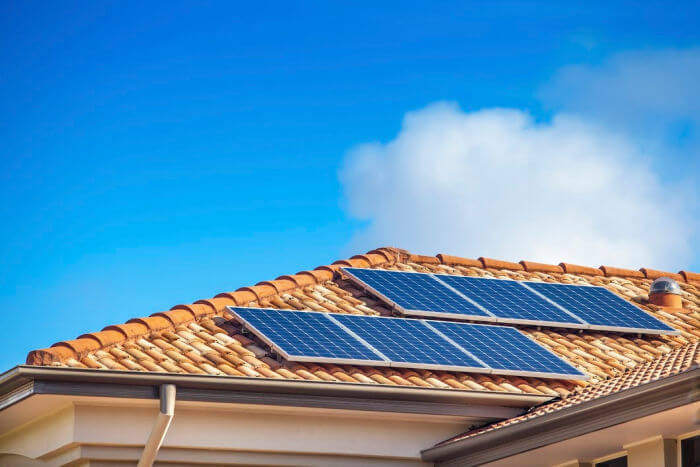
Some homeowners choose to live off the grid, relying on battery storage and generators. This installation will require an experienced solar panel installer who knows how to do this.
7. What Happens if My Panels Produce More Energy Than Needed?
This is a great problem to have, because the energy will not go to waste!
If your home produces extra energy, it can be fed into the city’s grid, and you receive a credit on your utility bill. This is called net metering. In the case of homeowners living off the grid, the excess power goes into their battery storage and is saved for when they are running low on solar power.
8. How Long Does a Solar Panel Warranty Last?
There are two types of solar panel warranties. The first is a performance warranty, which is the manufacturer backing the performance of the solar panels over the years. This can be available to Third Party Owner (TPO) products and typically lasts 25 to 30 years.
The second is the product warranty, which is protection should there be issues with the product. This lasts 15 to 25 years. As with any warranty, there are exceptions to what they will cover. Each warranty is going to vary depending on the manufacturer. However, taking advantage of your solar panel warranty can help you save more and protect your investment for longer.
9. Can I Lease Solar Panels Instead of Buying?
Yes. Some homeowners opt to lease the solar panel system rather than purchasing it. They pay a monthly fee for the energy generated, which can be significantly lower than the fees paid to your local utility company. When you lease solar panels, the solar company owns the actual panels and system.
Leasing also means you do not have to worry about the cost of repairs or routine maintenance. However, through leasing, you may not be able to take advantage of the savings offered by tax credits and rebates. Also, the savings in the long run might not be as great as those who own the solar panels, although most homeowners ideally are still saving more money than with conventional electricity within their first year.
Many solar companies offer as little as 0% down with both cash or loan purchase agreements available, so there are buying options for everyone. As an example, Sunrun offers a Power Purchase Agreement (PPA), where you pay a per kilowatt-hour rate for the electricity produced by the solar panels on your home that are still owned and maintained by the company.
10. What if I Move?
Homeowners have a few options with their solar panels when moving. If your new home is only a short distance away, the solar installer should be able to handle the reinstallation at your new location.
However, if you are moving to another city or state, you’ll have to weigh the costs versus benefits. It will be expensive to have solar panels removed, taken to a new destination, and reinstalled.
You also need to evaluate how well solar panels will perform in your new home, the permitting rules of that new city or state, and what incentives they have to offer. Some homeowners opt to take advantage of selling a home with solar panels, as this increases the value of the home and can be a selling point for many buyers. For those who leased the solar panels, simply call the company to have them transferred to a new location, the new homeowners, or cancel the plan altogether.
Final Thoughts on Installing Solar Panels
Potentially installing solar panels is an exciting decision! The benefits – like easy installation, positive environmental impacts, and lower utility bills – are enough to make any homeowner ready to dive into research.
Once you have thoroughly considered solar panel installation, the next step is finding trusted contractors that are up to the task. Modernize’s resources — including our contractor selection index, budgeting calculator, and more — are there to make it easy.
Find the Right Contractor for Your Solar Project
Whether you’re ready to begin your project now or need some expert advice, our network of contractors are here to help. With a few simple questions, we’ll find the best local professionals for you
Reviews from Real Homeowners
Welcome to Homeowner Resources! We are the Modernize blog. Modernize pairs more than 3 million homeowners a year with pre-vetted contractors in their area. This blog started because we believe homeowners should know everything about their homes, from how their HVAC works to which front door colors they might love. On Homeowner Resources, you can find information on every part of your home, right down to how you can negotiate with contractors to get the best price. Here's more about the blog.
Need a contractor? Learn more about how Modernize finds the right pro for you.
